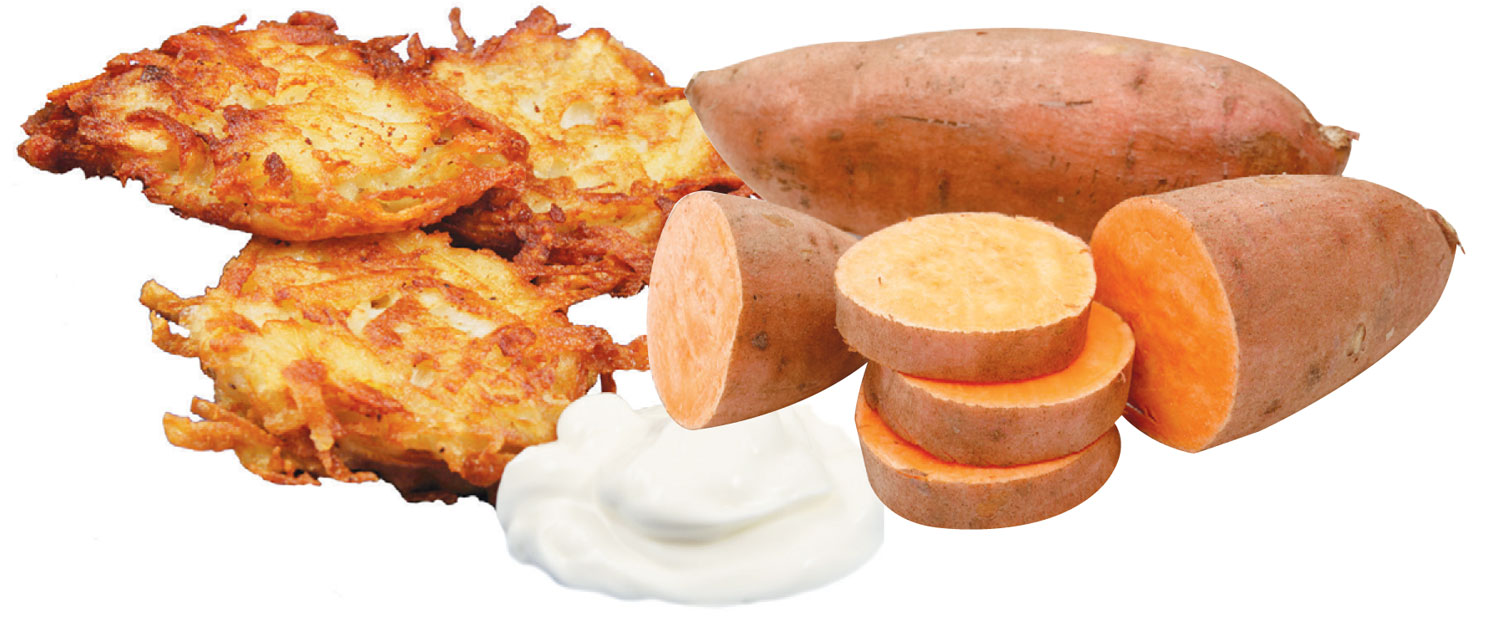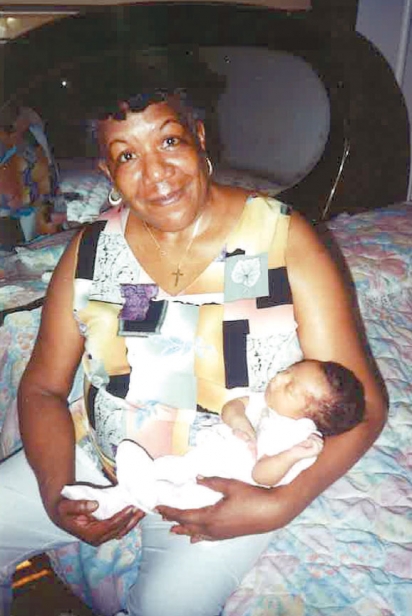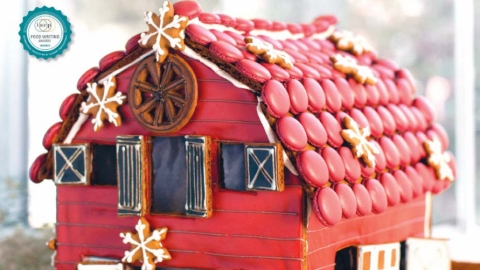A Sprinkle of Marlene - Honoring Grandma at Dysfunctional Thanksgiving
My grandmother was an African-American woman whose parents were from the South. She was born in Harlem, then moved to a Jewish neighborhood in Brooklyn when she got married. All these influences defined her dinner table for 39 Thanksgivings.
My cousins and I burned the roofs of our mouths crunching into hand-sized golden latkes, grabbing them straight from oily paper towels after they swam in a well-seasoned cast iron skillet. It wasn’t unprecedented for us to eat those steamy potato pancakes along with some applesauce, crispy fried chicken skin and collard greens with smoked ham hocks.
Grandma’s recipes—from her matzo ball soup for fevers and colds to her stuffed celery sticks that any one of us can whip up in a moment’s notice—prepared us for whatever life threw our way. As adults, we’ve come to label her legacy as “a sprinkle of Marlene,” which we celebrate every holiday season.
Marlene Wells, my grandmother, slept with a magnum bottle of Bacardi underneath her pillow—her tiny hand gripped the heavy, clear glass handle as she hummed herself to sleep. That practice ended her marriage around 1969. My grandfather left. My father and my aunt were preteens; my uncle was beginning to crawl. The abandonment, followed by an acrimonious divorce, led to heavier drinking. Marlene went from being a neglectful mother to a verbally abusive one.
My father and my aunt left their childhood home when they were teenagers to escape the daily, riotous belittlement from their mother, who was often in a drunken stupor. They were forced to become adults prematurely. They were ill-prepared for adulthood, much less parenthood.
When my parents abruptly split, my sister and I were deposited in a Brooklyn crack den to fend for ourselves. I was ten; my sister was one. Growing up, we bounced from house to house, shuffling between this family member and that family friend.
In 1997, I matriculated at a polytechnic university in New Jersey. I still shuffled around between friends’ couches during academic breaks, but I always found my way to Grandma’s for Thanksgiving weekend. We all did. As a mother, she had her flaws. To me, she was perfectly loving.
The summer before my junior year, I lived with Grandma, and we grew close, staying up late and telling jokes. She met my first serious boyfriend. Between two part-time jobs, I helped around the house. I learned her recipes for potato au gratin and flourless chocolate cake.
One night that summer, I griped to Grandma about not having a relationship with my mother. Grandma told me to look forward, and she reminded me that I wasn’t alone. “Many of our fellow black Americans have come from disturbing homes,” she said, naming several African-American celebrities in entertainment and literature. “Such backgrounds either lower your standards or make you strive to be the best.”
Grandma died that fall. She was found alone in her Williamsburg apartment.
I was a junior on the campus of NJIT when I got the news. My first reaction was to grab a couple of matzo crackers. I spread them with butter, taking small bites. The tears flowed. Everything I ate reminded me of Grandma. Selfishly, I thought, “What will become of Thanksgiving?”
Soon after, I lost contact with my paternal relatives, my father included, and my cousins. We weren’t equipped to stay together without our matriarch. I went on with my life. I finished college. I got a job and commuted to NYC. I got married. I became a mother.
My Thanksgivings evolved after I started my family in New Jersey. Caribbean influences crept onto my Thanksgiving table, courtesy of my husband, but he’s also eaten his fair share of my Grandma’s latkes instead of mashed potatoes on that fourth Thursday in November.
It was a long, emotional afternoon, and we decided never to lose contact again. “How about we get together around Thanksgiving?” We would do it for Grandma.
In 2009, after a long workday, I ran into one of my cousins at the Port Authority. We learned about each other’s careers, marriages and children. At his suggestion, the cousins got back together. It was a long, emotional afternoon, and we decided never to lose contact again. “How about we get together around Thanksgiving?” We would do it for Grandma.
Ever since, we’ve hosted our annual dysfunctional potluck. And every year, each of us present a dish that could have been on Grandma’s dinner table—but with a twist. The twist is affectionately known as “a sprinkle of Marlene.” A sprinkle of Marlene involves some sort of spirit—both the distilled liquid and the personal character definition of the word.
A sprinkle of Marlene can be both strong and volatile.
Our dishes change from year to year, but we each strive for our je ne sais quoi. Last year, I hoped mine would be a take on Grandma’s sweet potato soufflé. My sister had her doubts.
“I don’t know, Jess. You mean, like, a real soufflé?”
“Yes. The French-styled type that rises in the oven. And no marshmallows.”
“I don’t know, Jess.” my sister continued. “Besides, what’s going to be your ‘sprinkle of Marlene?’”
“I was thinking of making a dark rum sauce to put on the side.”
“Grandma would have been proud, but do you really think rum goes with sweet potatoes?”
I shrugged. “Bourbon, then?”
At dinner, we take a quiet moment and honor our grandmother’s memory fully—the good parts, the not-so-good parts.
“Remember that time Grandma was plastered,” my cousin will say. We all laugh, as if there were ever a time when Grandma wasn’t plastered. “I think Daddy went out to get cranberry sauce, but he was taking too long. Mommy said, ‘Let’s wait and say grace,’ and Grandma banged the table and said, ‘To hell with grace! I’m gonna eat!’ Who puts the words ‘hell’ and ‘grace’ in the same sentence?”
Grandma. Grandma would.
I’m not sure how we did it, but each of Marlene’s seven grandchildren have attended college, obtained degrees, obtained employment and/or launched entrepreneurial ventures. Except for my uncle’s young children, we are married and started our families in the Garden State.
At our dysfunctional Thanksgiving, a lot goes unsaid. None of us want to reopen wounds. Yet, I think we all find solace knowing we aren’t burdened with the obligatory discussion of the day’s politics or other provocative topics that other families work hard to avoid this time of year.
Our grandmother taught us not to allow our past or distance or differences in opinion to cause strife between us and our loved ones. I can hear Grandma say to me, to all of us, “I am so proud of you.”







